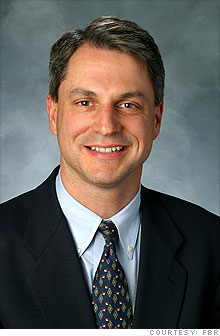Getting back into financial stocks
With the markets on the mend, fund manager David Ellison says there are great bargains to be had.
 |
| Ellison: "You don't get these opportunities very often to get through these cathartic events." |
| MMA | 0.69% |
| $10K MMA | 0.42% |
| 6 month CD | 0.94% |
| 1 yr CD | 1.49% |
| 5 yr CD | 1.93% |
NEW YORK (Fortune) -- Now that the housing crisis looks like it's really hit bottom, it's a good time to be a financial services investor, says David Ellison, president of FBR funds.
"When things are good or great, you don't really make any money. What's the upside?" he says. "You don't get these opportunities very often to get through these cathartic events."
Back in the first quarter of last year, Ellison says there were too many uncertainties in the fundamentals of the economy. But now that the economy has come through that period and enough healing has taken place, investors can get back in the market without having to worry about quite so many unknowns.
He points to residential real estate, where prices have fallen an average of 30% from their 2006 peak. "We haven't had a nationwide decline in residential real estate in this country in almost anyone's lifetime." Prices don't need to rise back to boom-time levels -- in fact, he would rather they stay in line with inflation or GDP growth. They just have to level out, and inventories need to come down.
During the last boom, banks were over-lending and making risky bets to produce higher returns. Ellison believes the slump has forced them to return to traditional lending standards and practices, which bodes well for their profitability in years to come.
He says banks are going to spend the next five years taking down risk and complexity. And people are buying homes to live in, not to flip. "The guys that can make loans today are going to be the guys that have the profit tomorrow to pay off the bad loans they made two years ago," he says.
Ellison managed to avoid devastating losses during the meltdown. He began shifting out of stocks six or seven quarters ago, when he saw banks reporting big increases in non-performing loans. At one point he had 60% of his portfolios in cash. Currently, both funds are less than 5% in cash, he says.
As a result of his timely moves, his FBR Small Cap Financial fund (FBRSX), which has $220.7 million in assets, is up about 1% from a year ago and about 25% from the start of the year, according to Morningstar. His FBR Large Cap Financial fund (FBRFX), with $44.7 million in assets, is down less than 1% from a year ago but up almost 40% so far this year.
But since the second quarter of 2009 he's moved his money into financial stocks. "The overriding assumption is five years from now most of the banks will be better than they are today," he says.
In his large cap portfolio, Ellison concentrates on the giants; according to Morningstar, Bank of America (BAC, Fortune 500) and J.P.Morgan Chase (JPM, Fortune 500) are his two largest holdings. "This is the American banking system," he says. "It's very simple."
In his small-cap fund, Ellison divides his portfolio into thirds. One-third is companies he knows are going to make it, and another third is companies that are good but not great, perhaps trading at a 30% discount and might double or triple your money. The final third is the best of the worst. The stocks are very cheap, and if they make it, investors will do well off them.
His top holdings in his small cap fund include Webster Financial Corp (WBS), Fifth Third Bancorp (FITB, Fortune 500), Astoria Financial Corporation (AF), and TCF Financial Corporation (TCB), according to Morningstar. ![]()
-
 The retail giant tops the Fortune 500 for the second year in a row. Who else made the list? More
The retail giant tops the Fortune 500 for the second year in a row. Who else made the list? More -
 This group of companies is all about social networking to connect with their customers. More
This group of companies is all about social networking to connect with their customers. More -
 The fight over the cholesterol medication is keeping a generic version from hitting the market. More
The fight over the cholesterol medication is keeping a generic version from hitting the market. More -
 Bin Laden may be dead, but the terrorist group he led doesn't need his money. More
Bin Laden may be dead, but the terrorist group he led doesn't need his money. More -
 U.S. real estate might be a mess, but in other parts of the world, home prices are jumping. More
U.S. real estate might be a mess, but in other parts of the world, home prices are jumping. More -
 Libya's output is a fraction of global production, but it's crucial to the nation's economy. More
Libya's output is a fraction of global production, but it's crucial to the nation's economy. More -
 Once rates start to rise, things could get ugly fast for our neighbors to the north. More
Once rates start to rise, things could get ugly fast for our neighbors to the north. More







